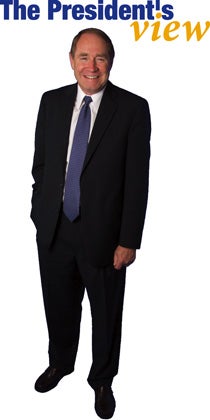A “simple message of hope”
 In these very difficult economic times, hope sometimes appears to be in short supply. All too frequently, our political system, which Americans have traditionally viewed as the best in the world, seems incapable of dealing with the challenges we face. Anger, fear, and cynicism seem abundant. We are saturated with depressing or alarming messages: Our communities are threatened, our public schools are failing, higher education—heretofore the best path to a higher standard of living—is increasingly difficult to afford for those who need it most. Where can hope be found?
In these very difficult economic times, hope sometimes appears to be in short supply. All too frequently, our political system, which Americans have traditionally viewed as the best in the world, seems incapable of dealing with the challenges we face. Anger, fear, and cynicism seem abundant. We are saturated with depressing or alarming messages: Our communities are threatened, our public schools are failing, higher education—heretofore the best path to a higher standard of living—is increasingly difficult to afford for those who need it most. Where can hope be found?
Remarkably, as this issue of QUAD ANGLES illustrates, inspiration and hope can be found in seemingly unlikely places. There are few groups in our nation as stigmatized, ostracized, belittled, and threatened as those who are lesbian, gay, bisexual, or transgendered. The University of Rhode Island is committed to changing this in our community and is committed to building a community here where everyone is welcomed, affirmed, and supported. It is one of our highest priorities, but we have quite a way to go. Nevertheless, a group of students came together at the Women’s Center at URI and created hope and inspired the entire University.
They raised thousands of dollars and devoted countless hours to plan and produce the video It Gets Better at URI: Coming Out for Change. It has been called a “simple message of hope”—and it is. But it is also a profound and inspirational response to a national problem: The prevalence of depression and suicide among LGBT young people. The young women who produced this video wanted to share the message that it can, and does, get better. The University of Rhode Island will be a better university, a stronger community, and a better environment for all its members as a result of their efforts. I am extremely proud of them and everyone at URI who shared their vision for hope and contributed their own story, or their support, to this project.
As is evident in this issue, a lot of things are getting better at the University of Rhode Island. We need to be a better university for the sake of our students, the state, our nation, and even the world. Our alumni, friends, and supporters are partners with us in this important endeavor.
—David M. Dooley

 Home
Home Browse
Browse Close
Close Events
Events Maps
Maps Email
Email Brightspace
Brightspace eCampus
eCampus


